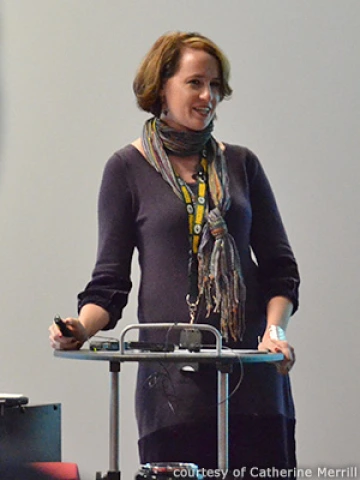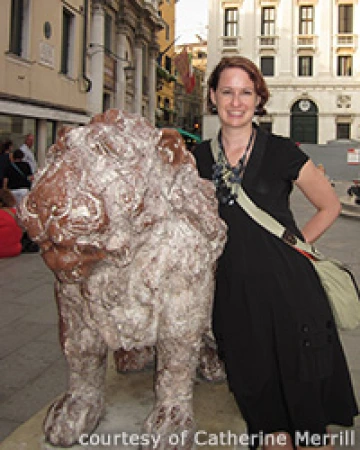Etendue: Catherine Merrill
Welcome to Etendue, featuring interesting and accomplished individuals known for their leadership and contributions both with their careers and the College of Optical Sciences, in their own words. (For a similar view on the college’s best and brightest – our students – please check out Another Wavelength among our Students in the Spotlight.)
This week, we hear from Catherine (Cat) Merrill, M.S. 2005.

Where are you from?
I was born in a town called Racine, Wisconsin. It is named for the Root River that runs through the town. I left there when I turned 18 and moved to Flagstaff, Arizona, to pursue my degree in physics. I loved the small-town feel of Flagstaff and the seasons. It helped having something familiar when I was young and adjusting to being on my own. When I was a junior in college, I got an internship at Raytheon Missile Systems. I moved to Tucson for that summer, and by the end of the internship, I had an offer for a full-time job. So I returned to Tucson after graduating in 2001. I have been in Tucson ever since. While at Raytheon, I was given a scholarship for my master's degree, which I completed at OSC.
Who or what influenced your interest in optics?
My father was an engineer and my mother was a surgical technician instructor, so technical thought and study was common in my family. However, I really did not know what I wanted to do with myself. Then I remember going on a field trip to Chicago's Adler Planetarium when I was in middle school. During the presentation, all my classmates fell asleep, but I was fascinated. I was interested in all of the information we knew about places we had never been and what information could be discerned from light. This inspired me in all my future classes. I really thought I would become an astronomer, but I could never handle the late nights. When I was in undergraduate school in physics, I took an optics class and found a course of study that resonated with me.

Describe your career.
My career started in missile defense. I was able to work with the sensor team on the Exoatmospheric Kill Vehicle in a variety of capacities. I learned how to develop and test requirements, calibrate an ultrasensitive system, perform post flight analysis, and be part of a team of people who modeled targets and created discrimination algorithms. I found my mentor, who encouraged me to continue my education in optics. After my master's, I was the lead on the EKV qualification program and had lead positions in the development and prove-in of new sensor designs.
I left Raytheon to be part of OSIRIS-REx here at the UA. I have spent the past three years as part of the team that will deliver the mission-critical camera system, OCAMS, in August 2015. I am currently transitioning to my new position as the program manager for the Giant Magellan Telescope mirrors.
Describe your current job.
My current position in OCAMS is two-fold. I am the lead systems engineer and the deputy program manager. As the lead systems engineer, I developed the requirements for each of the three cameras of OCAMS as well as the software and electronics box. The development of the requirements in a program like OSIRIS-REx is organic and required extensive communication with the customer and other partners. Once the requirements were defined, we documented why we felt the requirements were valid and developed a model that estimated our performance for use in design trades. My team and I then had to develop a verification program that evaluated all the requirements. As DPM, I aid my manager in the cost, schedule and risk management for the instrument. Both positions require that I work extensively with a variety of disciplines to ensure the system meets the needs of the program.
Share your single best OSC experience.
My single best experience at OSC was graduation. I worked at Raytheon while I went to school, and it was an achievement to complete the degree while still excelling at my job.
Why is staying involved with OSC important to you? How are you involved?
I frequently read about people questioning if college educations are worth the expense. While I do not believe that everyone needs a college degree, or that every college degree is worth the money, I also know that the technical community is lacking educated people. I believe that those of us in the technical fields need to support younger people for the good of the bigger community, but also so that some time, later in life, I can retire and have people who are qualified to take my place. I also believe that many people, especially women, are intimidated about pursuing a degree in the sciences, and that my success can inspire other women to believe in themselves and complete this course of study. With this in mind, I have decided to leave a portion of my estate to OSC to provide funds for future young people to complete their degree and have a chance at careers that will benefit all of us.

Name one neat fact about you.
I have a diary from my great-grandfather, written in 1904 during the settlement of Stanley, North Dakota, that also contains my family's history since the 1300s. The family history section was written in French, which influenced me to learn the language.
